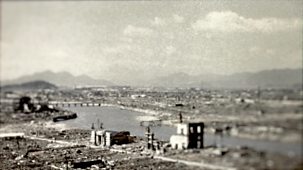
What Happened at Hiroshima
It’s 80 years since the US dropped atomic bombs on the Japanese cities of Hiroshima and Nagasaki, leading to the end of World War II. \n\nThe recorded death tolls are estimates, but it is thought that about 78,000 of Hiroshima’s 350,000 residents were killed instantly, and that at least 40,000 of Nagasaki’s 240,000 citizens died on impact.\n\nNow, with conflicts being fought across the world, talk of escalation and the threat of a new nuclear arms race is becoming louder and louder. \n\nBBC journalist Jordan Dunbar considers how we got to the events of August 1945 and what we can learn from them to stop history repeating itself. \n\nFrom the postwar nuclear arms race to the Cold War and now the many high-stakes conflicts the world faces today, we have come to a point where, once again, there is very real discussion of nuclear weapons being used in conflict.\n\nJordan speaks to survivors - some who have only just chosen to share their stories - who see echoes of the past in what is happening today. And he hears from a family in the UK about how they have been personally affected by the legacy of Hiroshima.
Source: BBC 1
Most recent episodes of What Happened at...?
What Happened At...?
What Happened At Hiroshima
It’s 80 years since the US dropped atomic bombs on the Japanese cities of Hiroshima and Nagasaki, leading to the end of World War II. \n\nThe recorded death tolls are est ...
15-08-2025
BBC 1
Most popular episodes of What Happened at...?
What Happened At...?
What Happened At Hiroshima
It’s 80 years since the US dropped atomic bombs on the Japanese cities of Hiroshima and Nagasaki, leading to the end of World War II. \n\nThe recorded death tolls are est ...
15-08-2025
BBC 1

